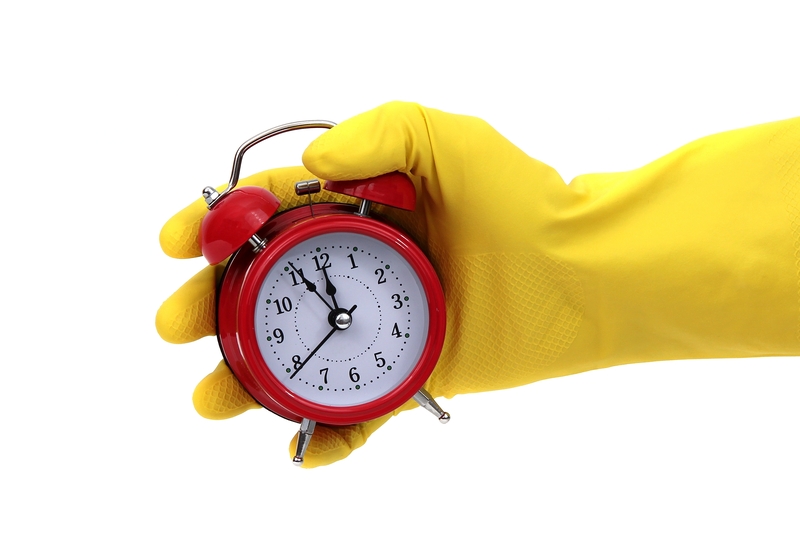A Guide to Eco-Conscious Recycling of Pots and Pans
Posted on 07/06/2025
A Guide to Eco-Conscious Recycling of Pots and Pans
If you're passionate about sustainability or seeking practical ways to reduce your household waste, learning how to responsibly recycle pots and pans is an important step. Many people face uncertainty over what to do with old cookware, but improper disposal can contribute to environmental pollution and resource depletion. In this comprehensive guide, we'll explore eco-conscious recycling options, reuse ideas, and best practices for giving your pots and pans a second life.
Why Recycle Pots and Pans Responsibly?
Kitchen cookware such as pots, pans, and skillets are usually made from metals like stainless steel, aluminum, copper, or cast iron. Some may feature non-stick coatings or plastic handles. These materials are durable but can have a significant environmental impact if sent to landfill, as metals don't biodegrade and production is resource-intensive.
- Aluminum and steel are 100% recyclable, endlessly. Recycling them lowers demand for virgin ore and reduces greenhouse gas emissions.
- Old cookware in landfills can leach chemicals (especially from coatings) and contribute to soil pollution.
- Responsible disposal conserves natural resources--every recycled pan saves raw materials and energy.
Eco-friendly cookware recycling not only minimizes your carbon footprint but also supports the circular economy: giving products and materials multiple lives before they reach their true end of use.

Understanding What Pots and Pans Can Be Recycled
Not all pots and pans are created equal when it comes to recycling. The recyclability depends on their material and local recycling regulations.
Common Cookware Materials and Their Recycling Options
- Stainless Steel: Highly recyclable, often accepted at scrap metal and recycling centers.
- Aluminum: Readily recycled, both at curbside or special drop-off locations.
- Copper: Valuable for scrap yards, but must be clean and separated from non-copper parts.
- Cast Iron: Durable and recyclable; some specialty facilities accept it, or donate if in working condition.
- Non-stick Pans: These pose challenges due to Teflon or ceramic coatings. Clean metal pans may be accepted at scrap yards, provided you remove plastic/silicone handles.
- Pots with Plastic/Glass Components: Remove non-metal parts before recycling, as mixed materials are generally not accepted.
Pots and Pans That Cannot Be Recycled Curbside
Most municipal recycling programs won't accept cookware in your normal bin due to their size, shape, or material blends. Placing them in curbside bins can cause machinery jams at recycling centers or contaminate the recycling stream. Check with your local program for specifics and proper drop-off locations.
How to Prep Your Cookware for Recycling
Preparing your pots and pans is crucial for eco-responsible recycling. Follow these steps:
- Remove all non-metal attachments: This includes plastic, glass, silicone, or wood handles and knobs. Use screwdrivers or pliers if needed. Most recycling facilities require pure metal items.
- Clean thoroughly: Wash off any food residue or oils. Dirty items may be rejected or slow down recycling processes.
- Sort by metal type: If dropping off at a scrap yard, separate aluminum, steel, and copper items for efficient processing and better rates.
Pro tip: A magnet can help you differentiate metals. Stainless steel will attract a magnet, while aluminum will not.
Where to Recycle Old Pots and Pans
There are various sustainable ways to recycle pots and pans, depending on your area and the items' condition.
1. Scrap Metal Yards
- Most scrap yards welcome metal cookware, including broken pots and pans.
- Sort by material for easier drop-off.
- Some may even pay you for common metals like aluminum or copper.
2. Specialized Recycling Centers
- Household hazardous waste events sometimes collect cookware with non-stick coatings.
- Lookup dedicated appliance or metal recycling facilities in your city.
- Earth911.com or your local government's website can help locate eco-friendly disposal sites.
3. Manufacturer Take-Back Programs
- Some brands offer return or trade-in programs for old cookware (e.g., Calphalon's ReNew program).
- Check if the original manufacturer will recycle or upcycle your old pans for you.
4. Reuse and Donation
- If your cookware is still usable, consider donating to charity shops, thrift stores, shelters, or community kitchens.
- Local schools or art studios may want old pots for non-food uses (e.g., art projects, tool storage).
Creative Ways to Give New Life to Old Cookware
Upcycling Ideas for Old Pots and Pans
If you're feeling crafty, why not repurpose your old cookware at home? Here are some inspiring upcycling projects:
- Planters: Drill drainage holes and turn pans into quirky garden pots.
- Outdoor sinks or basins: Cast iron or steel pots make rustic mini-sinks for gardens or off-grid cabins.
- Birdbaths: Large, shallow pans create unique birdbaths or feeding stations.
- Wall clocks: With some paint and a clock kit, transform a frying pan into a kitchen-themed clock.
- Candle molds: Make homemade candles in old saucepans.
- Organizer trays: Use small pans as tray organizers for tools, art supplies, or jewelry.
- Wind chimes: Suspend several pans or lids with string and enjoy musical garden art.
These creative approaches reduce waste and add personality to your home or garden--while still honoring eco-conscious principles.
Eco-Conscious Recycling of Non-Stick and Coated Cookware
Modern pans often contain non-stick coatings (like Teflon or ceramic), which raises extra environmental concerns. Here's how to handle them responsibly:
Can You Recycle Non-Stick Pans?
- Most curbside and scrap metal recyclers DON'T accept non-stick cookware due to chemical coatings.
- If the coating is completely worn off and you've removed all non-metal parts, some scrap yards may take the exposed metal (confirm in advance).
- Look for specialty recycling programs or manufacturer take-back schemes for non-stick items.
- Never incinerate or break apart non-stick pans at home: this can release toxic fumes.
Tip: For pans that are still in usable condition (but past their prime for cooking), consider donating to be used as craft or plant containers, instead of for food use.
The Environmental Impact of Throwing Away Cookware
When old cookware ends up in landfills, the consequences are long-lasting:
- Metals like aluminum, steel, and copper remain in landfill virtually forever.
- Non-stick coatings or enamel can leach chemicals into soil and water sources.
- Disposing cookware in normal waste streams wastes valuable resources that could be recycled indefinitely.
By choosing eco-conscious recycling methods, you help keep hazardous materials out of landfills, support resource conservation, and promote a healthier environment.
How to Reduce Cookware Waste in the Future
Eco-friendly living isn't just about recycling--it's also about making smarter choices from the start. Here's how you can reduce the need to recycle or discard cookware in the future:
- Buy high-quality pots and pans that last for years, instead of disposable or cheap items.
- Choose materials like stainless steel, cast iron, or fully recyclable aluminum when purchasing new cookware.
- Consider multi-purpose cookware that can serve several roles in your kitchen, reducing the number of items needed.
- Avoid pans with unnecessary, hard-to-recycle components like plastics or mixed materials.
- Follow manufacturer care instructions to extend the life of your pots and pans.
- Repair minor damage (e.g., tightening handles or re-seasoning cast iron) before discarding.

Frequently Asked Questions About Eco-Conscious Pot and Pan Disposal
Q: Can I put old pots and pans in my curbside recycling bin?
A: Generally no. Most municipal programs do NOT process cookware in curbside bins due to size and material complexity. Always check with your local guidelines.
Q: Do thrift stores accept used pots and pans?
A: If they're clean and usable, many thrift shops, shelters, or community kitchens will gladly accept them. Contact your local donation center for policies.
Q: How should I dispose of non-stick or Teflon pans?
A: Do NOT place in curbside bins or incinerate. Remove non-metal parts and seek specialized drop-off, manufacturer take-back, or household hazardous waste collection events.
Q: What if my cookware is missing handles, scratched, or non-functional?
A: Scrap metal recycling centers will usually accept metal pots and pans in any condition if prepared properly--just remove plastic or wood.
Q: Is it safe to use old or corroded cookware for cooking?
A: Damaged, corroded, or heavily worn non-stick pans should NEVER be used for cooking, as they can leach harmful substances. But they can be repurposed or recycled!
Conclusion: Make Eco-Conscious Recycling of Pots and Pans Your New Habit
Making the choice to recycle pots and pans responsibly is a small but powerful step in your sustainable living journey. By choosing the right recycling method, donating usable items, or creatively upcycling old cookware, you're not just decluttering your kitchen--you're helping the planet.
Stay informed about your community's recycling practices, educate others in your household about the importance of eco-friendly disposal, and inspire friends or neighbors to join you in responsible pot and pan recycling. Every pan you keep out of landfill is a win for the environment!
Remember: The most eco-conscious kitchen is one where every item is used, reused, and recycled to the fullest before being replaced. Let's cook up a greener world, one pot and pan at a time!
Latest Posts
The Hidden Impact of Air Quality on Health and Productivity
Essential End of Tenancy Cleaning Guide Every Tenant Needs
Unlock the Mystery of Streak-Free Window Glass
Unlock a Fresh Aesthetic with Comprehensive Carpet and Floor Solutions





